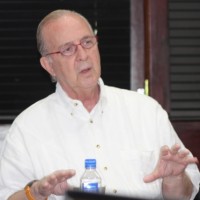
Congress got its fill of fisheries expertise and the impact of marine monuments on local fishing industries this week. KHJ News Washington correspondent Matt Kaye reports, American Samoa’s tuna industry had its allies and detractors before a House panel…
It’s no secret Natural Resources Chair Rob Bishop and American Samoa’s Congresswoman Aumua Amata Radewagen don’t like the fishing restrictions of the Pacific Remote Islands Marine National Monument, established by former President Obama.
The two have written President Trump to remove them and reinstate federal fisheries management law in the monument.
But in a bid to establish a hearing record for possible future legislation to limit presidential power to declare monuments under the Antiquities Act, the Water, Power and Oceans Subcommittee invited expert witnesses–including American Tunaboat Association chief Brian Hallman—
Play Audio
Hallman says ATA argued the decision was not based on science, that the tunas in the Remote Islands Monument are “highly migratory” and fishing there was already regulated and sustainable.
He added, more US restrictions only help US competitors.
Not everyone agreed with Hallman. University of North Carolina biology professor John Bruno—
Play Audio
But American Samoa’s Aumua Amata Radewagen countered, the impact on the local economy of placing such a large area off-limits has not been zero–
Play Audio
…and Hallman says his boats, alone, spend $50-to-$60-million a year in American Samoa…
The Pacific Legal Foundation that litigates for private-property rights has already joined Massachusetts lobstermen in court, against former President Obama’s declaration of a huge Atlantic monument.
PLF calls it a “blatant abuse”of the Antiquities Act that limits monuments to “land” owned or controlled by the federal government—not water.




